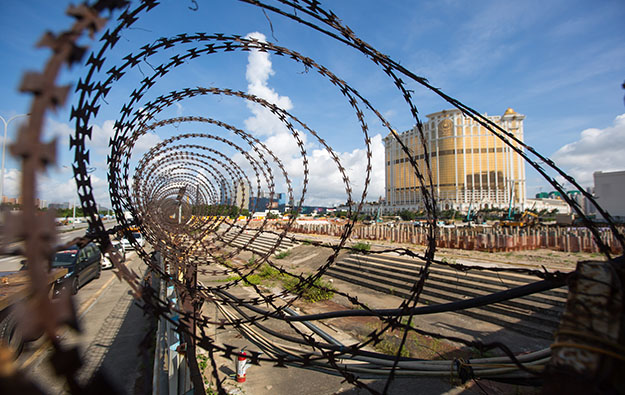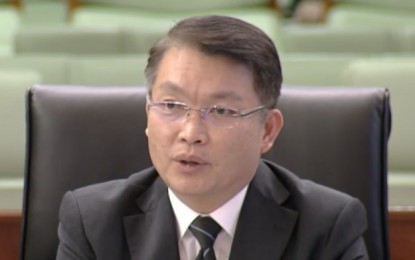Long land rights means hard to boot Macau ops: Bernstein
Dec 13, 2018 Newsdesk Latest News, Macau, Top of the deck

A new research report spells out just how much overhang exists between the typically 25-year casino land leases held by Macau’s six casino licensees and the expiry dates – either in 2020 or 2022 – of the current gaming concessions.
Predictably, the greatest overhang is for those Cotai resorts only just opened. In the case of Grand Lisboa Palace from SJM Holdings Ltd, due to open next year, the overhang between the end of the operator concession – in 2020 – and the expiry of the land concession for that particular property – in 2038 – is as much as 18 years, indicates a 28-page analysis from brokerage Sanford C. Bernstein Ltd.
The report published on Wednesday – by analysts Vitaly Umansky, Kelsey Zhu and Eunice Lee – also dealt with the possible economic risk to the Macau gambling market from the United States-China trade war; the impact of the Macau-wide smoking ban in casinos in 2019; the role of infrastructure improvements on gambling demand in Macau; and capacity constraints linked to the available number of hotel rooms in that market.
The Sanford Bernstein team noted on the land concession topic: “The land leases do not expire for gaming operators until 2026-2038 (depending on the property), but even then are extendable at the option of the lessee through 2049.”
The brokerage added that while the government could exercise the option to take back control of the gaming areas in the current concessions’ resorts at the end of the current gaming licences, this only covered “casino floors and tables, representing a very small percentage of square footage of an entire property”. The government would not legally at that point have access to non-casino areas – assuming there was no breach on land concession conditions on the part of the holder – “making it virtually impossible to operate a casino without the cooperation of the real estate owner (i.e., the current concessionaire)”.
Comparative table
Although the idea is not a new one, a data graphic compiled by Sanford Bernstein listing all the major Macau resorts shows that even the shortest land concession overhang – that for Studio City, a property majority owned by Melco Resorts and Entertainment Ltd – lasts four years longer than Melco Resorts’ Macau gaming concession.
In the case of the Venetian Macao, Four Seasons Macao and the Parisian Macao, operated by Sands China Ltd, a unit of U.S.-based Las Vegas Sands Corp, the land concession dates from when the Venetian Macao opened in 2007, meaning the entire concession expires in 2032, although the Parisian only opened in 2016.
Turning to U.S.-China trade tensions, the report authors noted: “If the Chinese government chooses to take away the gaming concession from a U.S. operator, the result would be quite counter-effective to China’s attempts to open up the country for greater foreign investment and the negative public relations surrounding such action would be detrimental.”
As well as Sands China having U.S. parentage, Wynn Macau Ltd is controlled by Las Vegas, Nevada-based Wynn Resorts Ltd, and MGM China Holdings Ltd is majority owned by U.S.-based MGM Resorts International.
Sanford Bernstein wrote that in the event such companies did not see their rights refreshed in the Macau market, they could choose to shut down their “entire gaming infrastructure in Macau (a nuclear option) by shutting down the non-gaming elements of the integrated resorts”.
The brokerage added: ‘The result would be unemployment, a drop in tax revenues and a chaotic environment in the city – something that we do not believe the Macau or the Chinese governments would want.”
Smoking rules
Mr Umansky and his colleagues also discussed the implementation of new smoking rules in Macau’s casinos starting from January 1, 2019.
Macau’s Legislative Assembly passed on July 14, 2017 a revised bill on smoking that bans tableside tobacco use in VIP rooms – the only places in the Macau casino context that were still allowing smoking at the gaming table. Although the new rules came into force on January 1, 2018, tableside smoking at VIP rooms will in effect be permitted until January 1, 2019, as casinos have been given a year’s grace period to set up smoking lounges for VIP players.
Under the revised law, all smoking lounges in casinos – including the existing ones set up on mass floors since the ban on free-for-all casino smoking – will also have to conform to enhanced technical standards.
Discussing the matter, the Sanford Bernstein analysts stated: “If the government does not fully enforce the smoking ban, some operators will ignore the ban and turn a blind eye to smoking violations in more secluded VIP areas. However, the smoking ban is likely a headwind for the industry.”
But they added any negative impact from the smoking ban would “likely be temporary”.
“The overhang will be eliminated once players have figured out a new routine, and also the details around where smoking rooms are, etc,” the brokerage added.
While welcoming recent infrastructure improvements, such as the Hong Kong-Zhuhai-Macau Bridge, that links Macau to Hong Kong International Airport, the report authors stated the barrier to expanding Macau’s mass-market casino gross gaming revenue (GGR) was “the limitation of hotel room availability”.
They added: “Macau hotels are currently running at 90-plus percent occupancy rates… without further expansion in number of rooms, it’s hard to grow the overnight business, which is what most customers based outside of Guangdong province will fall into.”
“We estimate Macau may have approximately 45,000 rooms by early 2021, up from 39,000 today,” which Sanford Bernstein said would be a 7 percent compound annual growth rate (CAGR) between 2017 and 2020, compared to a “10 percent CAGR between 2014 and today”.
Regarding macroeconomic headwinds for the Macau market, Sanford Bernstein noted: “The biggest misconception around the current downturn is that it may be a repeat of the down cycle experienced in 2014-2016.”
That, it said, had been linked to economic slowdown in China; the country’s anti-corruption campaign; and a “collapse of the junket system” due to what the brokerage termed “debt collection issues, over extension of credit and severe liquidity tightening”.
In the current market, though there had been “softness over the past few months in the Chinese economy, we want to highlight that the economy overall is still growing. We are confident in our circa 5 percent gross gaming revenue (GGR) growth rate forecast for 2019, followed by a rebounding growth rate in 2020”, said the brokerage.
Related articles
-
 Grand Lisboa to tap ex-junket space as...
Grand Lisboa to tap ex-junket space as...Nov 13, 2024
-
 Galaxy Ent can opt new finance model...
Galaxy Ent can opt new finance model...Nov 12, 2024
More news
-
 Macau to get 36mln visitors in 2025:...
Macau to get 36mln visitors in 2025:...Nov 21, 2024
-
 EBITDA a focus in Macau market share...
EBITDA a focus in Macau market share...Nov 21, 2024
Latest News
Nov 21, 2024
Macau’s 2025 visitor tally could reach 36 million, or a circa 9-percent gain on this year’s projected 33 million. So said Lei Wai Nong (pictured in a file photo), the city’s Secretary for...Sign up to our FREE Newsletter
 (Click here for more)
(Click here for more)
Pick of the Day
”[Baccarat side bets in Macau] are becoming more popular amongst players, based on what we observed when we conducted our [monthly premium mass] table surveys”
George Choi and Timothy Chau
Analysts at Citigroup
Most Popular
 Best whale since Macau monthly survey began in 2017: Citi November 18, 2024
Best whale since Macau monthly survey began in 2017: Citi November 18, 2024  Marina Bay Sands tapping US$9bln loan to expand: report November 19, 2024
Marina Bay Sands tapping US$9bln loan to expand: report November 19, 2024  US$30bln 2025 GGR target achievable for Macau: CE November 19, 2024
US$30bln 2025 GGR target achievable for Macau: CE November 19, 2024  RWS casino renewal 2yrs on ‘unsatisfactory’ tourism… November 19, 2024
RWS casino renewal 2yrs on ‘unsatisfactory’ tourism… November 19, 2024  Gaming technology firm IGT reports hacking incident November 21, 2024
Gaming technology firm IGT reports hacking incident November 21, 2024









